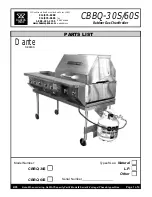
13
6 WHAT IF...
6.1 WHAT IF I SUSPECT A GAS LEAK
If you suspect a gas leak, turn off the gas supply at the gas meter
and contact your installer or local gas supplier. If you require
further advice please contact a qualified Service Technician
.
6.2 WHAT IF I HAVE FREQUENTLY TO INCREASE THE
SYSTEM PRESSURE
If the system regularly requires the pressure increased, it may be
indicative of a leak. Please contact your installer and ask him to
inspect the system.
6.3 WHAT IF THE APPLIANCE IS DUE ITS ANNUAL
SERVICE
Advice for tenants only
Your landlord should arrange for servicing.
Advice for homeowners
9
NOTICE:
Please contact your qualified local service technician
to have your appliance serviced. If you do not have a service
technician, please contact your local
R
distributor and
they will provide you with a recommendation.
9
WARNING:
Failure to have the boiler properly serviced and
inspected on a regular basis by a qualified service technician
may result in property damage, serious injury or death.
9
WARNING:
Failure to keep the Vent and Combustion Air-
intake clear of ice, snow and other debris may result in
property damage, serious injury or death.
6.4 WHAT IF I NEED TO CALL A SERVICE TECHNICIAN
If you think your boiler may have developed a fault, please
contact your installer or your local
R
distributor.
Have all your details in hand including full address, relevant
contact numbers and your complete boiler serial number.
7 MAINTENANCE
7.1 SUGGESTED MINIMUM MAINTENANCE SCHEDULE
Regular service by a qualified service agency and maintenance
must be performed to ensure maximum operating efficiency.
Periodic maintenance is essential to the safety, efficiency and
lifetime of the boiler.
It allows for the reduction of consumption, polluting emissions
and keeping the product reliable over time.
The frequency of servicing will depend upon the particular
installation conditions, but in general, once per year should be
sufficient. It is the law that any service work is carried out by a
competent person such as a qualified technician, an approved
service agent, or other suitably qualified personnel.
9
WARNING:
Service should only be carried out by a qualified
service technician. This appliance produces carbon
monoxide (CO) gases. The venting should never be taken
apart by anyone other than a qualified technician. The
venting should not be separated. Failure to comply may
result in severe personal injury or death.
9
WARNING:
To avoid electric shock, disconnect electrical
supply before performing maintenance.
9
WARNING:
Annual service should ONLY be performed by a
qualified service agency. Schedule annual service by calling
a licensed service agency.
-
Visually check top of vent for soot. Call service person to clean.
Some sediment at bottom of vent is normal.
-
Visually inspect all flue product carrying areas of the boiler
including the venting system and main burner for proper
function, deterioration or leakage. Ensure that condensate
drains are inspected and ensure that condensate is being
directed to appropriate condensate management system or
drain, as required by local codes.
-
Check that area is free from combustible materials, gasoline,
and other flammable vapors and liquids.
-
Check for and remove any obstruction to the flow of combustion
or ventilation air to heater.
-
Check operation of safety devices. Refer to manufacturers’
instructions.
-
Listen for water flow noises indicating a drop in boiler water
flow rate
-
To avoid potential of severe burn, DO NOT REST HANDS ON OR
GRASP PIPES. Use a light touch; return piping will heat up
quickly.
-
Check fan and fan motor.
-
Check for piping leaks around pumps, relief valves and
other fittings. Repair, if found. DO NOT use petroleum-based
stopleak.
-
Check relief valve. Refer to manufacturer’s instructions on
valve.
-
Check the condensate check valve dispositive and, if necessary,
please contact your Service Technician.
Verify proper operation after servicing.
9
WARNING:
The pressure relief valve lever must be operated
at least once a year by qualified personnel during annual
maintenance to ensure that water-ways are clear.
Cleaning
-
To clean the outer casing use only a clean damp cloth. Do not
use any scourers or abrasive cleaners.
-
The Condensate Trap must be periodically disassembled and
cleaned as part of a regular maintenance plan. Failure to
clean the trap regularly can cause condensate drain blockage
leading to boiler malfunction, property damage and even
personal injury.
CAUTION:
Glycol must be replaced periodically due to degradation
of inhibitors over time. Follow all glycol manufacturer’s
instructions.






































